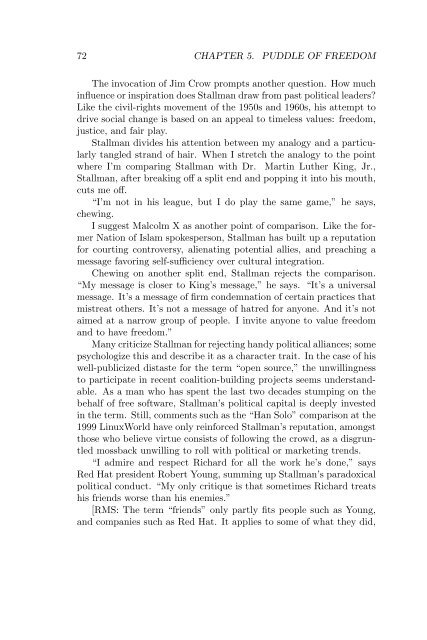Create successful ePaper yourself
Turn your PDF publications into a flip-book with our unique Google optimized e-Paper software.
72 CHAPTER 5. PUDDLE OF FREEDOM<br />
The invocation of Jim Crow prompts another question. How much<br />
influence or inspiration does Stallman draw from past political leaders?<br />
Like the civil-rights movement of the 1950s and 1960s, his attempt to<br />
drive social change is based on an appeal to timeless values: freedom,<br />
justice, and fair play.<br />
Stallman divides his attention between my analogy and a particularly<br />
tangled strand of hair. When I stretch the analogy to the point<br />
where I’m comparing Stallman with Dr. Martin Luther King, Jr.,<br />
Stallman, after breaking off a split end and popping it into his mouth,<br />
cuts me off.<br />
“I’m not in his league, but I do play the same game,” he says,<br />
chewing.<br />
I suggest Malcolm X as another point of comparison. Like the former<br />
Nation of Islam spokesperson, Stallman has built up a reputation<br />
for courting controversy, alienating potential allies, and preaching a<br />
message favoring self-sufficiency over cultural integration.<br />
Chewing on another split end, Stallman rejects the comparison.<br />
“My message is closer to King’s message,” he says. “It’s a universal<br />
message. It’s a message of firm condemnation of certain practices that<br />
mistreat others. It’s not a message of hatred for anyone. And it’s not<br />
aimed at a narrow group of people. I invite anyone to value freedom<br />
and to have freedom.”<br />
Many criticize Stallman for rejecting handy political alliances; some<br />
psychologize this and describe it as a character trait. In the case of his<br />
well-publicized distaste for the term “open source,” the unwillingness<br />
to participate in recent coalition-building projects seems understandable.<br />
As a man who has spent the last two decades stumping on the<br />
behalf of free software, Stallman’s political capital is deeply invested<br />
in the term. Still, comments such as the “Han Solo” comparison at the<br />
1999 LinuxWorld have only reinforced Stallman’s reputation, amongst<br />
those who believe virtue consists of following the crowd, as a disgruntled<br />
mossback unwilling to roll with political or marketing trends.<br />
“I admire and respect Richard for all the work he’s done,” says<br />
Red Hat president Robert Young, summing up Stallman’s paradoxical<br />
political conduct. “My only critique is that sometimes Richard treats<br />
his friends worse than his enemies.”<br />
[RMS: The term “friends” only partly fits people such as Young,<br />
and companies such as Red Hat. It applies to some of what they did,


